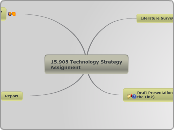15.905 Technology Strategy Assignment
Literature Survey
Managing product Families: the Case of the Sony Walkman,”
The Power of Product Platforms (Book)
The product family and the dynamics of core capability (Meyer, Utterback)
Thinking about technology: Applying a cognitive lens to technical change
Profit Beyond Measure by Johnson and Broms (Book)
“Technological Discontinuities and Organizational Environments,”
Draft Presentation (Click the World Icon for the Link)
Click the World Icon for Link to Summary Spreadsheet
Report
What is a Product System?
It is a family of products sharing some commonalities ( a core). .
What is common in a product system?
What can be different in a product system?
You have to know where to stop in making things common !!!
Advantages
The recurring costs are reduced. New products can be introduced faster once the product family is mature.
Disadvantages
There are some overheads introduced. It is easier to develop an independent product.
Existing Approaches / Literature Summary
Our Unique Approaches
Breadth of a product family is an indication of expertise and continued existence of the company in the field. Which increases the perception of trust.
Results/Wrap-up
